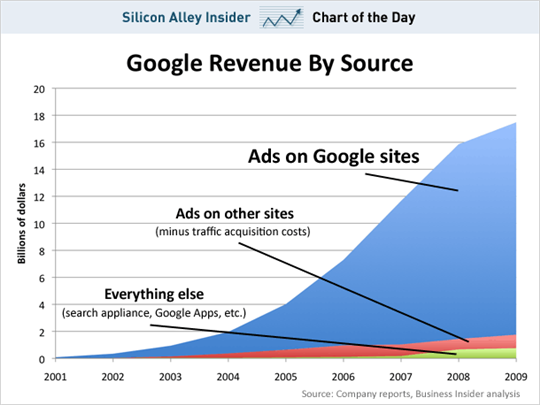It seems like in the past few months Google has relentlessly released new applications, some of which perhaps could have used some more baking in the oven before they were unleashed on the general public. To some it’s becoming a tiresome exercise simply to try to keep up with everything that Google is doing week in and week out. But there is a method to the madness, and it has a lot more to do with Google’s bottom line than you may think.

We all know that the way the search engine giant makes money is through advertising – over $23 billion in 2009 – but what may surprise you is that its advertising-based revenue comes almost exclusively from sites that are owned by Google.
Guest author Daniel Cawrey is a freelance writer and tech enthusiast, among other things. You can check out his latest musings in blog form at thechromesource, where he writes about Chrome browser, Chrome OS and just plain Google in general.
Take a look at this graph from the
that depicts the location of advertising and the dollars associated with it:

Ever increasingly, Google is relying on itself to make money through its own real estate – places where it can position the ads that advertisers purchase. This is a concern for publishers that rely on Google for revenue through Adsense because there has to be a point at which this is no longer a profitable exercise for the company.
If it reaches that point, Google will essentially be subsidizing publishers. And it may not have a choice but to keep doing so. Because without fresh content creation, what is there for users to search for on the Internet that is of value? The main tenet of the search business is to provide quality results, and while that may be the case now, if publisher’s Adsense revenues were affected, one can wonder what kind of effect that would have on content.
So although Google may have made some mistakes with applications like Buzz, along with the half-hearted emergence and now slow death of features like Gears, expect them to continue to increasing space for content to grow, even if that means one of several strategies:
Become an ISP
An experimental program has been announced whereby Google will provide gigabit service via fiber directly to homes in select markets. Interested municipalities and community organizations are encouraged to submit a proposal for this right. At the World Mobile Congress, CEO Eric Schmidt talked about the goal of this program being purely experimental, which means showing infrastructure operators such as cable companies that this is possible, rather than Google becoming a full fledged ISP. But once the fiber has been rolled out, it doesn’t roll back in, does it? How long does the “experiment” last?
Trounce the Competition in the Browser Wars
Google’s Chrome browser is getting a lucky break over the next few weeks. That’s because Windows users in Europe who use Internet Explorer will be getting an update to their machines notifying them about browser choices that they have. This is in response to the European Union’s ruling that Microsoft’s practice of bundling Internet Explorer with Windows restricts competition. While the update offers many browser choices, the result will be a boost to market share for Chrome. It has steadily grown in popularity and already has roughly 5% of the market since emerging in 2008.
Offer Computing Architecture to Device Manufacturers Completely Free
We’ve seen this already with Android, and it appears that the no-cost operating system has basically saved Motorola from a fall to obscurity with its release of the Droid. Expect to see more of these developments as 2010 unfolds with Chrome OS attempting to break into not only the netbook market, but also tablets and smartbooks, which fill the gap between a high end mobile phone and a netbook.
So when you hear these new announcements of applications and services that Google rolls out, think of content. Think of how they can better deliver information to users. They want it to be as easy and as seamless as possible. While sometimes these initiatives don’t always work out, they aren’t going to stop trying.

















